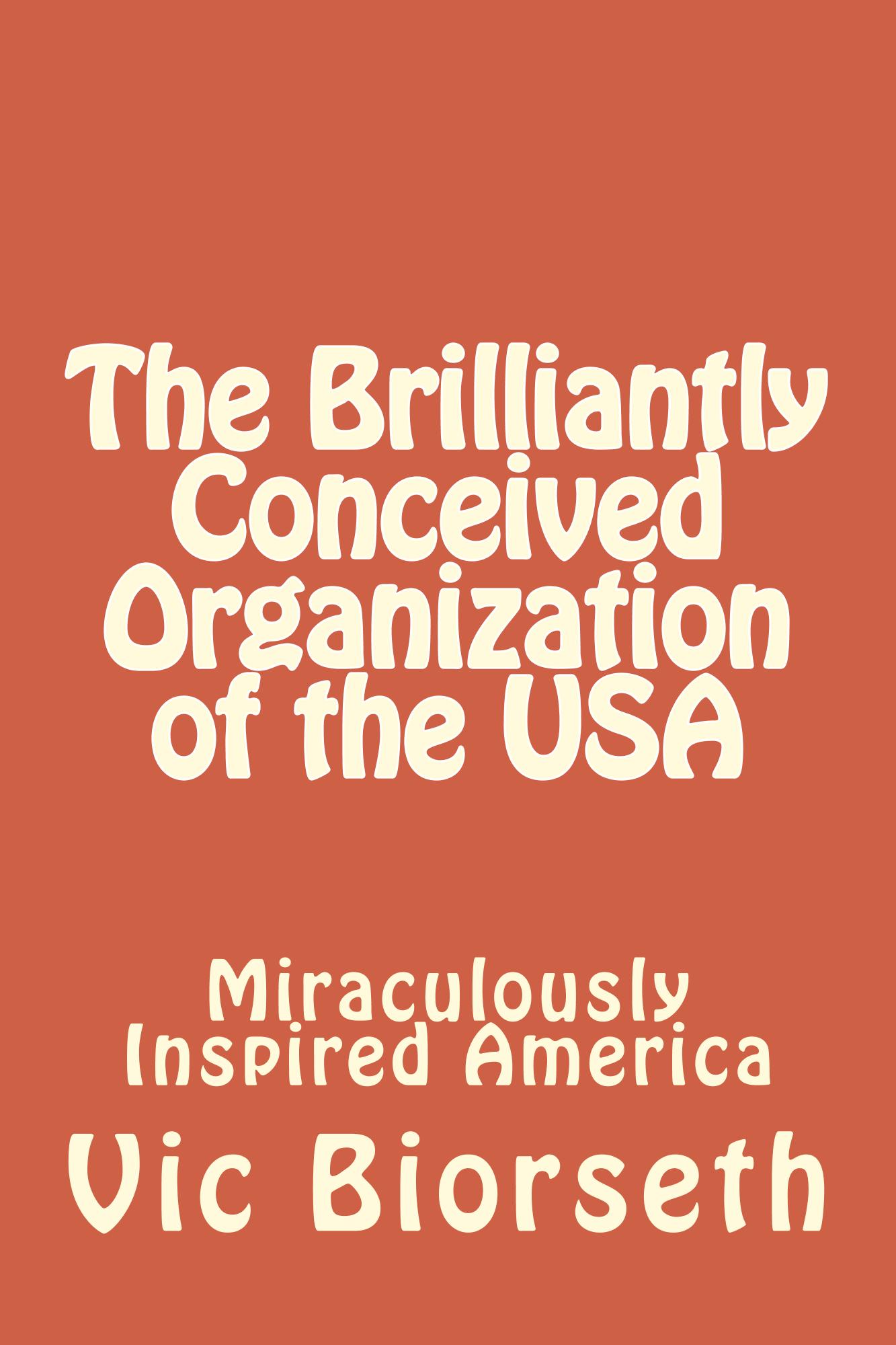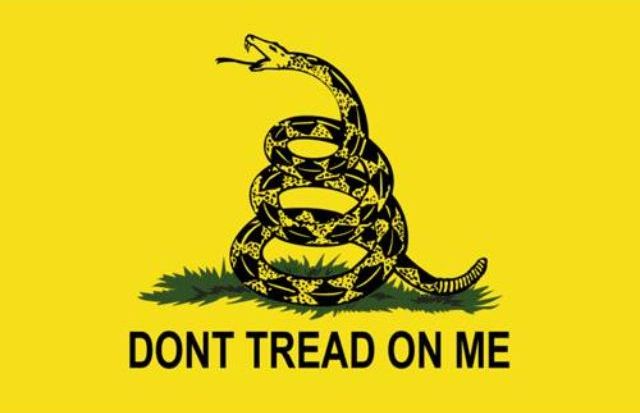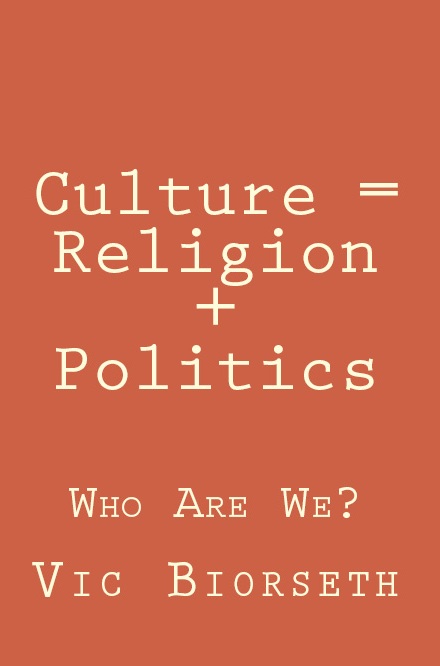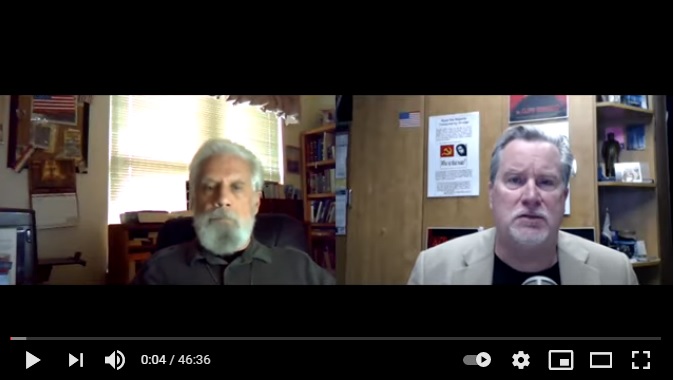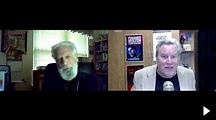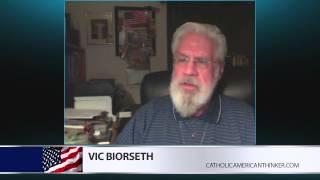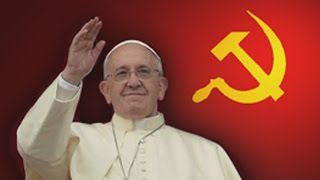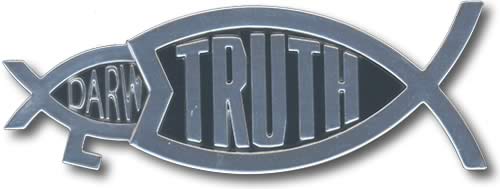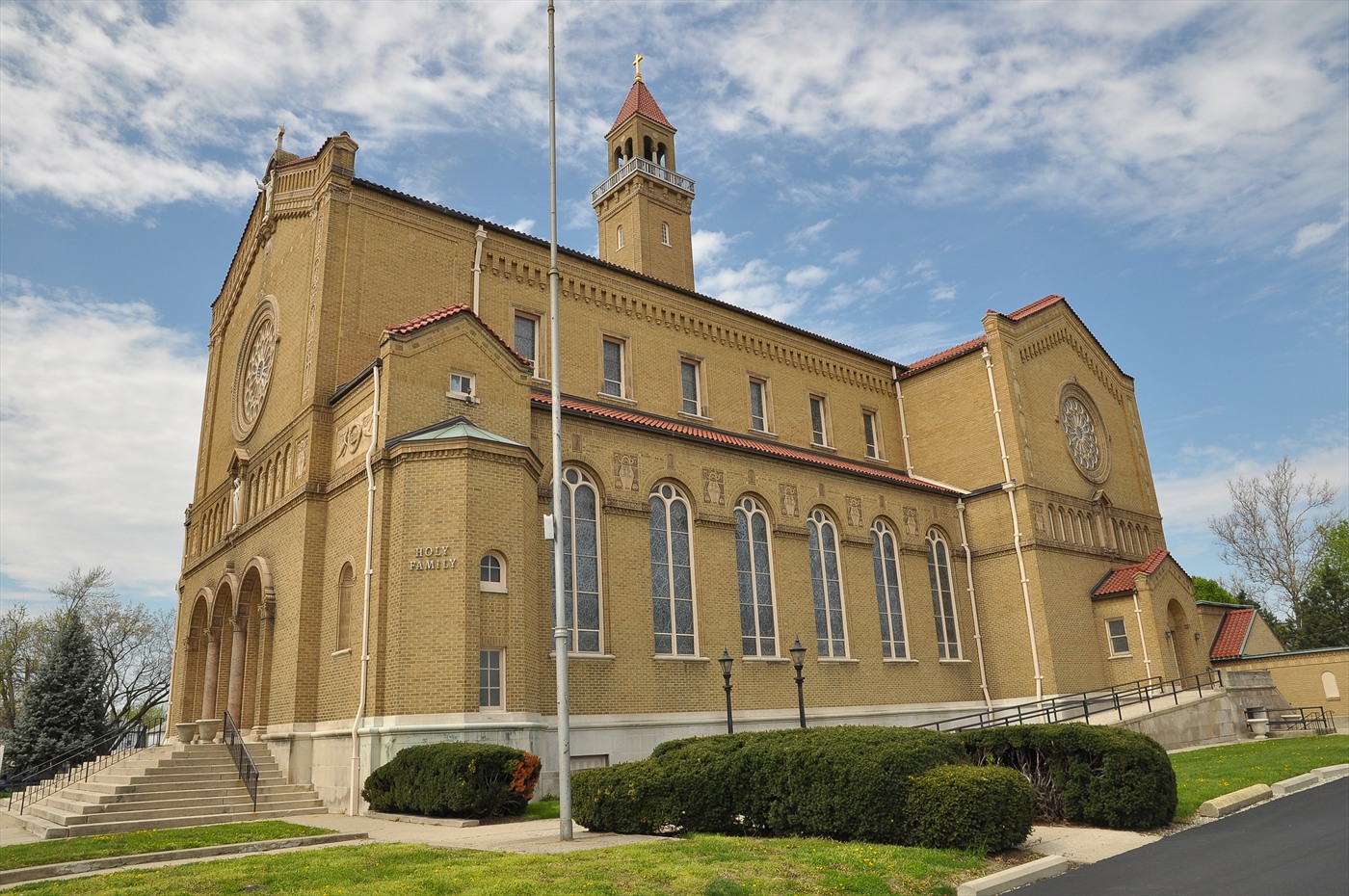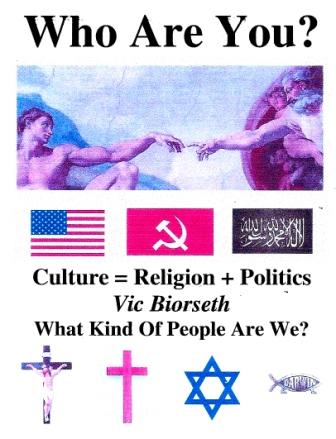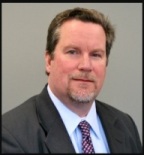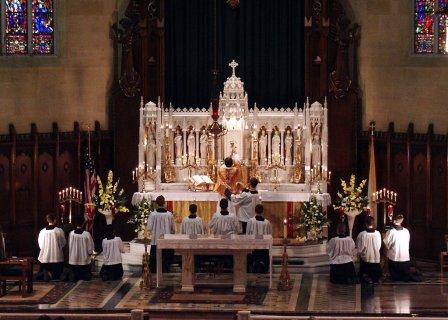Formerly the Thinking Catholic Strategic Center
Confirming Culture=Religion+Politics
Christology
Athenaeum of Ohio LPMP Christology Course: NOT about the Christ Who Rose Again.
This theoretically Catholic Christology course teaches about a Christ Who didn't know who he was, didn't necessarily rise again after death, but Who "teaches us valuable lessons" nonetheless.
Taught In The Name of Archbishop Daniel Pilarczyk, and with his full blessing.
Vic Biorseth, http://www.CatholicAmericanThinker.com
A truly unique Christology. This page in the Catholic American Thinker will describe the Lay Pastoral Ministry Program (LPMP) Christology course, taken the Winter quarter of 200-2001.
The course material was steeped in historical-critical method Scripture scholarship that, predictably, sought empirical and materialistic evidences for ephemeral phenomena, such as, of course, miracles. Historical-critical Scripture scholars never met a miracle they could accept.
Based on this great, worldly scholarship, the text, and the professor, insisted that Jesus Christ did not know Who He was, did not know His mission, and did not necessarily rise from the dead. Scripture quotes in which Jesus proclaimed Himself to be God and the Son of God notwithstanding, modernist Scripture scholarship insists upon this more worldly definition of Christ. The whole purpose of this Christology class appeared to be to relegate Jesus Christ to the status of a very important historical figure.
===
The course title was Jesus, The Christ Of Faith LPC 123(86). The instructor was Fr. Richard M. Walling. The text was The College Student's Introduction To Christology; William P. Loewe; The Liturgical Press, hereinafter referred to as Loewe.
Fr. Walling’s teaching style was classical and scholarly; he spent entire class times in non-stop lecture mode, communicating such mountains of knowledge that – it seems to lesser mortals like me – it should take more than a single lifetime to accumulate. There were reading assignments for each class, from the assigned Christology text book and the Catechism of the Catholic Church. Of the two, I would take the Catechism, hands down. I have yet to find anything in it that I cannot agree with, or that cannot be easily taught or defended on many levels and in many ways. I have no problem at all with Fr. Walling’s teaching method; my problem was with what he taught. My main problem was with the assigned Christology text book. If there be any solid ground from which to criticize Fr. Walling in teaching this particular class, it might be in his selection of the text book, and his strident defense of it.
The book (Loewe) is obviously a recent offspring of the continually developing field of the “historical-critical” method of Scripture scholarship, which was originally born of Enlightenment-era Protestant / Diest anti-Catholicism [New Jerome Biblical Commentary, Raymond E. Brown, S.S., Joseph A. Fitzmyer, S.J., Roland E. Murphy, O.Carm., Prenice Hall, 1990; pages 1113 – 1145].
From this historical criticism's earliest beginnings, it opposed the pope, all dogma, Tradition, hierarchy and authority, and sought another approach to Scripture interpretation. In using strictly worldly methods, it predominantly came up with strictly worldly explanations for various phenomena. In my opinion, historical-criticism is a piss-poor methodology for studying Scripture, and a horrible method for developing a Christology.
Following this anti-Catholic tradition, Loewe attacks “top down” theology (Magisterial teaching) and builds up “bottom up” theology, in which the people, free from any dogma, doctrine, hierarchy or authority, are free to approach and develop their own individualistic theology. Apparently, either to produce many every-man-for-himself religions, or a general, fuzzy-wuzzy, all-encompassing, I’m-OK-you’re-OK religion of infinite variability and indifferentism. Anything to accommodate the world, current and future.
Being a bit of an empiricist myself, what I find particularly irritating about Loewe is his abuse of the terms empirical and empiricism. He is implying in this book that the research methods of the historical scholars he quotes and relies on are born of hard science, and that all of this is a rigid sort of science, with solid, empirical evidences that are “scientific” and therefore beyond reproach. I think Loewe, and perhaps many of the scholars he quotes, no matter how well lettered they may be, take themselves far to seriously. Scripture criticism – no matter what method it uses or claims to use – is literary criticism, pure and simple.
And Scripture criticism is literary criticism done on work that is thousands of years old. It cannot, therefore, be anywhere near as accurate as literary criticism of literature written this year. Which, of course, cannot be completely accurate, because it is almost purely subjective; it comes from the mind of the one doing the criticism and nowhere else, and therefore it cannot possibly be objective, except in some small degree. Editorial or literary criticism involves the written words of someone being analyzed by the mind of someone else.
No matter how much the “scientist” studies the period, the surrounding history, culture, language, archaeology, geology or anything else, when it’s all boiled down, he is reduced to criticizing literature that someone else produced, and that is a purely subjective activity that cannot be backed up with any solid “empirical” evidence. Period.
Therein lies the rub. The analysis method involves worldly proofs; Scripture includes ephemeral, other-worldly, non-empirical things, including miracles; and any study of Jesus Christ - Christology - involves the study of God. It just doesn't get any more other-worldly and unempirical than that.
Modernist Scripture scholars seemingly never met a miracle they didn’t’ doubt, and Loewe questions them all, including even the Resurrection itself. I have encountered elements of dogma – i.e., the Creed – called into question in other books and in other classes in the LPMP, as you can see elsewhere in the Catholic American Thinker, but this Christology book attacks more Church teaching than all the others combined.
The evidences that I supplied to the Archbishop were mostly my assignment papers with Fr. Walling's extensive notes written on them, because Fr. Walling did not have an e-mail address, we did not correspond and our few personal conversations were brief. But my assignment paper footnotes pointed to page, chapter and verse of the texts I challenged, and that Fr. Walling's notes strongly defended. They showed not only the Catholic doctrinal error, but the tone and intent of Loewe. I did enjoy his class, to some degree; whatever I got out of it I got from the lectures. But the book drove me to distraction, and I cannot understand how Fr. Walling, or any truly orthodox Catholic, could possibly defend it with a straight face.
Again, this was the required text book for the Christology class, we produced six papers based on reading assignments in it, and we were tested on the contents of this Christology textbook six times. It was not a small part of the Christology class; indeed, it was the major subject matter of the course.
And, significantly, the Archbishop found nothing particularly heterodox about this supposedly orthodox Catholic teaching in his supposedly Roman Catholic teaching institution. Interestingly, he introduced the word heretical into the discourse; I only called it heterodox.
From this point on, I will simply put my reading assignment papers, as turned-in. Not having any agreement with Fr. Walling, at this time I will not include his notes. My paper footnotes, I will put right in the body of the text, enclosed with brackets, like [this], because even though footnotes work fine in Microsoft Word, they do not work so well on a website. Also, wherever it seems appropriate, I will include the actual quoted subject matter along with the footnote references, so you don't have to look them all up. These papers pretty well show what Loewe, and the LPMP Christology course, was all about.
Christology LPC 123
Paper One: Introduction to Christology (Loewe)
Chapters 1 and 2
The first two chapters of Loewe’s Introduction To Christology raise some rather interesting questions. There is quite a mixing of theology and empiricism here. But empiricism may properly address only worldly things.
As Trent addressed the errors attendant to the Reformation, Vatican I addressed, among other things, some of the errors attendant to Modernism. Among other things (and not for the first time) Vatican I taught, as dogma, that God is the Author of Scripture, and hence all of Scripture is free of error; and further, that the infallible Church maintains the sole right to correctly interpret her Scripture. It further anathematized anyone who would dismiss or question Scriptural miracles, or even hold “that miracles can never be recognized with certainty.” Nowhere has the Church claimed, however, to infallibly teach or enact dogma or doctrine relating to astronomy, physics, mathematics, or anything else other than Christian faith and morals, as revealed and/or enlightened by Scripture and Tradition. We have no Catholic dogmas on chemistry, for instance. Today, Vatican II has been and is being held by many to have been some sort of pivotal point at which the Church had “turned a corner” to allow us to think that Scripture could contain all sorts of errors, pertaining not only to areas of history and material science, but even religion itself. But it is rather stunning to see how few times (if ever) it is noted, by the new experts, how many times that Vatican II’s Dei Verbum refers in its own footnotes back to the very strongest pronouncements of Vatican I.
It seems to me that Loewe and many of those he quotes have made the exact same error that first got Galileo into hot water with the pope. Galileo, and Copernicus before him, had no problem with the Church at all, and in fact had Church support, until he made some loud public pronouncements regarding how Matthew 25:30 could not be correct if the earth were round, because the people on the other side of the world could not see the Lord coming. That is what started the whole mess, although the stew got thicker and thicker as the story progressed. But, I maintain, if Galileo had stuck to worldly science – the empirical study of material things – and left Scripture interpretation to the Church, he would never have had any problem with the Church in the first place. How people on the other side of the world might see the Second Coming is not given us; blessed are they who have not seen and who believe [Jn. 20:29].
God is other-worldly, i.e., super-natural, and He cannot be empirically studied. Miracles are mysteries, i.e., things about which we may only know part, not all. Since all public Revelation ended with the Apostolic Age, short of some personal private revelation, all we can know about God we must depend on the Church to pass on to us. My whole point here is this: the very existence in this world of one unchanging Gospel message logically demands the ongoing existence in this world of some infallible authority to preserve it and to properly teach it.
[“The most obvious answer, then, to the question, why we yield to the authority of the Church in the questions and developments of faith, is, that some authority there must be if there is a revelation given, and other authority there is none but she. A revelation is not given, if there be no authority to decide what it is that is given. In the words of St. Peter to her Divine Master and Lord, “To whom shall we go?” Nor must it be forgotten in confirmation, that Scripture expressly calls the Church “the pillar and ground of the Truth,” and promises her as by covenant that “the Spirit of the Lord that is upon her, and His words which He has put in her mouth shall not depart out of her mouth, nor out of the mouth of her seed, nor out of the mouth of her seed’s seed, from henceforth and for ever.”]
[An Essay on the Development of Christian Doctrine; John Henry Cardinal Newman; Notre Dame Press; 1989 (original 1878); pages 88 and 89. He refers to 1 Tim 3:16; Isa. 59:21]
The pronouncement on page 8 that the existence of God is “not something that can be taken for granted” in contemporary culture, and therefore that the “high, descending” approach is “inappropriate in today’s culture” makes me wonder if the problem might be with the culture rather than the message. People believe what they are taught; children tend to believe their teachers and role models; if people are taught that God is “questionable,” then they will question His existence. We seem to be made to wonder about things, by our nature. And so the premises re the “first naiveté” and the “hermeneutic of suspicion” are quite understandable and predictable. However, even in the absence of good catechesis, the objective searcher may still end up recognizing and bowing before Mystery, and accepting Revelation as another kind of “objective” truth – truth that is independent of his mind. If I can accept the existence of the physical mysteries (what is beyond the event-horizon of a black hole; what is gravity; what is magnetism; what is matter; where did matter come from and what is it doing here; etc., etc., etc.) then why should I not accept a super-natural mystery? All of this tells me that the ministry of the future is in proper catechesis.
In the treatment of the “Old Quest” the author (or the facts he was recording) seemed to relegate the supernaturalists to the lonely, far-right column reserved for “fundamentalists” who were pretty well as much out of touch as the left-column ones who relegated Christ to being a fraud or a failure. Which carried with it the veiled insinuation that there might not be any such thing as the super-natural, or perhaps, only at the ultimate primal-cause of everything, there might be found one and only one super-natural something. Which was the foundation of Deism. Even Thomas Jefferson, an otherwise brilliant man, delved into this stuff, and even re-wrote his own version of the New Testament, leaving out all of those pesky miracles that could not be empirically explained. Leaving Christ as a life example rather than the Redeemer.
Now there exists quite a span between those who say that none of Scripture is history, and none may be taken literally, and those who say that all of Scripture is historical fact, and all of it must be taken quite literally. Obviously, both positions are equally in error. But I am not certain that the most correct position is exactly centered between those two extremes. At the moment, I find myself on the “fundamentalist” side of center, and probably not too close to the center, since I actually believe all of the elements of the Creed that I profess. Among other things, that includes the Virgin Birth. An event I could never hope to work out the biological mechanics of, and could never explain, and could never even begin to understand. Any more than I could ever hope to understand the nature of the singularity that is theoretically at the center of a black hole. Mathematics leads us right up to the event horizon, but no farther; the math blows up right there, yet strongly suggests what goes on beyond that point. Beyond that, even light may not escape, certainly no message or information. But I am free to wonder about it and to probe it in whatever ways become available over time.
However, Nicodemus was a searcher, too. And I cannot forget our Lord’s admonition to him towards the end of the Baptismal discourse, when He said to Nicodemus: do not wonder at this [Jn. 3:7]. I might be wrong, but, I take that to mean, do not try to understand this.
After all, how could we understand such a thing as being reborn, or a virgin birth?
Christology LPC 123
Paper Two: Introduction to Christology (Loewe)
Chapters 3 and 4
According to Loewe, the first naiveté gives way to a hermeneutic of suspicion based on empiricism. But I have yet to see any empiricism that addresses the super-natural. In fact, I have yet to see any empiricism that addresses any of the soft sciences, or sciences of ideas and subjective “truths;” sciences such as psychology, sociology, history, political science, etc. On page 11 Loewe gives great credence to two of history’s three biggest failures in the area of advancing truth. Freud, easily the most quoted name in psychology, the father of psycho-therapy, has been thoroughly exposed as a complete fraud and quack in multiple sources, as has been the second most quoted name in psychology, Jung, and as has been the third most quoted name, Kinsey.
[What’s Wrong With Freud? Rudolf Allers, M.D., Ph.D. Psychological Seduction: The Failure of Modern Psychology; William K. Kilpatrick. Victims Of Memory: Sex Abuse Accusations and Shattered Lives; Mark Pendergrast. Kinsey: Crimes & Consequences; Judith A. Reisman, Ph.D.]
This “science” so dear to the hearts of modernists directly opposes Christian teaching regarding, just for one instance, the notion of sin. But Loewe goes on to use Darwin's dogmas to show how someone’s first naiveté might give way to a hermeneutic of suspicion, if he is a thinker. And Darwin is even more under attack these days than Freud, with that whole field of study undergoing a sort of implosion, with the two major branches, the punctuated equilibrium (punk-eek to students) school battling with the fundamentalist gradualists, and with insults and name-calling entering the game.
[ Darwin On Trial; Phillip E. Johnson. Darwin’s Black Box; Michael J. Behe]
The problems are legion. There exists no evidence, for instance, fossil or living, of any link species between any two species, fossil or living, which makes a rather embarrassing statement about evolutionary empiricism. Which is most glaring before, during and after the period known as the Cambrian Explosion, but is clear and obvious everywhere. Added to that difficulty is the complete lack of a transition mechanism to explain punk-eek. And then there is the difficulty of the law of entropy, or the third law of thermodynamics, which tells us that things left alone become more simple over time, not more complex. And then there is the problem of irreducible complexity, which has shown mathematically the rather startling statement that the entire universe has not been in existence long enough for even the very simplest of single evolutionary events to have possibly occurred, by an order of magnitude. In point of fact, the entire “modernist” scientific viewpoint has been under increasingly successful attack, by empirical science, for some time, as an advance of something called scientism.
[The Counter Revolution of Science: Studies on the Abuse of Reason; F. A. Hayek. The Ultimate Resource; Julian L. Simon]
The only one of my personal Big Three names associated with the modern advance of error that Loewe left out of his book, so far, is Karl Marx. Unfortunately, these are the general consensus theories accepted as true today, around the globe.
So if the obvious growth ministry of the Church in the future is in proper catechesis, perhaps an equally important growth vocation for secular society in the future might be proper classical education.
Although Loewe doesn’t dwell on it in his book as much as I do here, it bothers me that anyone so obviously bright can just accept something given as scientific that turns out to be false, without question, and then question something given as not natural and not testable, and then seek to somehow test it and prove or disprove it, and treat it as though it were worldly. Oh well.
Source, Form and Redaction criticism, along with the principles of Dissimilarity, Coherence and Embarrassment, are all fascinating (to me) tools of editorial criticism. But I’m not sure of the application, because, looking through the lens of faith, it seems to me the Jesus was a contradiction from the start, and everything about Him was contradictory. His was the only life lived backwards. He was the only one to come into the world not to live, but to die. He was born in Bethlehem beneath the long shadow cast backwards through time from His own cross of crucifixion. I’m not sure someone could get to that by blocking out faith for the sake of objectivity and solely studying Scripture in such an empirical manner. And I have the feeling that putting one’s faith aside, even for a moment, is pretty much against the religion of everyone who has a real religion.
I found Bultmann’s position interesting. Based on the Protestant dogma of Sola Fides, he felt that the quest for the historical Jesus was an attempt to save oneself by one’s own works rather than relying in faith on God’s grace. While my view of this work, this quest for the historical Jesus, is quite limited, it appears to me from this one book that the quest involves, at least in part, and by some of the practitioners, systematic attempts at material explanations for or discounting of miracles, the discounting of divinity, a near religious cleansing of the Scriptures, and the reduction of Jesus to a mere moral teacher, at best. One wonders how anyone could consider such work to be thought of by anyone as possibly salvific. (But, of course, there is the hermeneutic of recovery . . .)
Loewe sees the New Quest as a very positive thing; while it does not seek to prove faith, it seeks to determine whether faith can be seen as a possible, if not necessary, response to Jesus as he appears to the “empirical” historian. I’m not sure what to make of that altogether, but I think he’s trying to come at Traditional faith backwards, sort of, by playing scientist and objectively studying history, and seeing if he winds up at the place he began, or somewhere else. He says the New Quest does not seek to prove Traditional faith; but then he wants to see if the same Traditional faith can be arrived at historically, with no other means. I think it might be possible, but not by a mind that is closed in any area, and Traditional faith is an area, as is simple faith, or any kind of faith. To believe that religious faith impairs objectivity is the curse of modernist secularized scientists; it closes their minds to a world of possibilities. To believe or pretend to believe that God does not exist exhibits another kind of faith, and such a person is faithful to something that cannot be empirically tested or proved. The confirmed atheist is just as faithful as the Catholic. He certainly cannot claim empiricism to back his belief system.
Christology LPC 123
Paper Three: Introduction to Christology (Loewe)
Chapters 5 and 6
Your quoted statement that a mystery is something inexhaustibly knowable gives pause, as serious food for thought. Is knowable, in this context, synonymous with understandable? I get the impression that Loewe (or his method) and the Quest for the Historical Jesus seeks to get to the point of understanding events, including miracles, sufficiently to explain to others in order to get them to also understand. That is what Loewe’s book seems to be trying to do. Someone might be able to inexhaustibly “know” of God’s existence and utter dependability, but it strains credulity to imagine any earthly being who can inexhaustibly understand Him. Which brings us back to using “empirical” methods to test immaterial things. As much as I hate to harp on one topic, it is quite clear that the author and the theologians / historians / scholars he writes about are trying to use empirical, i.e., “scientific,” methods to prove something solid and understandable about the nature of Jesus Christ.
[It is altogether fitting and proper to be, simultaneously, an empiricist and a Roman Catholic. But it is just as completely inappropriate to apply a rigid empiricism to the nature of Christ as to apply theological faith to, say, mathematics. Loewe and friends have lost their balance.]
There still exists today, however weakened, a grand old tradition of reductionist empiricism that remains deeply skeptical of “conventional wisdom,” broad, sweeping generalities, large abstract systems, and all-encompassing explanations. Now the pure empiricist (if there is any such thing) is necessarily a pure materialist, because pure empiricism may address only matter. (I use the first sense or definition of empiricism here, involving systematic experiment and objective observation.) When we look at history, we cannot be totally empirical. We can look at pages and fragments, whether they may be papyrus, leather, skins, or whatever, and we can look at the ink or whatever was used to write on them, and we can look at where they were found, and produce all sorts of empirical “facts” about them. At another level, working from a myriad of separate historical sources, we can say of Jesus, among other things, that He was a first century Jew Who was condemned by Pilate; these kinds of historical “facts” are recognized by just about all objective observers as fairly solid, approaching empirical, testable, objective truth, even passing the (historical) test of falsifiability. But as soon as we move into the realm of the more complex ideas behind the words on the printed pages – the virgin conception, for instance – we then begin to move from objectivity into subjectivity, and the task becomes less and less empirical and more and more hypothetical.
Conjecture, no matter how “scientific,” no matter how highly educated, no matter how many eminent and learned scholars might share it, never rises above the level of being a guess. We have no solid reason to assume that Mark was written first, and we have no solid reason to assume even the existence of Q, either as some historical personage or as a document, since even its very existence has only been guessed at, and it merely represents an idea that has been guessed into being and then generally accepted. Among these historical/critical scholars, Q has become axiomatic, in the same vein as Darwin’s origin of species, neo-Darwinism’s selfish genes, Freud’s infantile traumas, neo-Freudianism’s repressed memory syndrome, the Gnostic-Jungian hidden meaning behind coincidences, and, the collective subconscious, Marx’s modes of production, the neo-Marxian global village, and so many other “truths” today that have nothing whatsoever to back them up other than thin air and quick, broad consensus. (We all just “know” that the globe is warming.) But axioms may not reasonably be derived from purely sensory observations. Observation alone, by its very nature, cannot produce axioms. I submit that there exists no substantial reason to reject the older notion that the four Gospel authors were Matthew, Mark, Luke and John, or that they each worked quite independently.
When Historical-Critical-method scholars examine the ideas behind the words of the Gospels, they are doing editorial criticism, pure and simple, on work that is over 1,900 years old. If the Times and the Post can give directly opposing criticisms of literature just published – even within their own pages – then how accurate may we expect these Scripture scholars to be in their purely subjective interpretations, criticisms and “scientific” deductions, done on such ancient literature? This work is and can only be produced by pure subjectivism, of scholars devoid of, or who have temporarily divorced themselves from, belief in God, ostensibly in the interest of maintaining some level of blind objectivity. Their work is therefore fraudulent.
Since the non-existence of God cannot be empirically proved, it is a subjective rather than an objective notion, blind acceptance of which even further colors already subjective conclusions, which can never be seen as objective. The work of the secularized “scientist” is heavily skewed by his very strong dogmatic faith in a pure, sole, naturalism. The naturalist/rationalist Scripture scholar begins his research with a conclusion – that all other-worldly phenomena are quite impossible – then he studies a Scriptural miracle. Most of today’s soft-scientists are aping most of today’s hard-scientists (or, if not most, then at least most of those who get into popular print) who, today, do the same sort of thing.
What is overlooked in Loewe is that Jesus was (and is,) first and always, a sign of contradiction, a sign that would be opposed, then, and now. This “scholarship” is looking for the normal (i.e., material explanations) in the most paranormal document history has ever produced. The world cries out for empiricism, and in the world, empiricism is very much needed; but Jesus – Who is not of this world – calls us to be His sheep, not His critical scholars, His teaching demands faith, not understanding, we are called to come to Him as little children, not as empiricists, and any study of Him involves theology, not physics. Vawter begins with an assumption (dogmatic?) that the only proper approach is, case by case, to study each Scriptural miracle with your mind and then personally judge whether it was a miracle or not. In other words, every-man-for-himself miracle interpretation; sounds like Sola Scriptura, does it not? The same “scholars” who condemn literal interpretation by others, use it, even stretching the context, just to highlight the impracticality of Jesus’ words.
[Page 78; “turn the other cheek” interpreted as universal law, even to the soldier on the eve of battle; etc., etc., etc.]
It smells of bias, but what is worse than bias is all of the pure, classic, pseudo-science, in all its glory. This book cannot hope to bring anyone one iota closer to the real Christ.
And, there are the continuing scholarly questions of whether Jesus knew Who He was. Right. Regarding the four Gospels alone, I quickly found just a few places where our Lord personally referred to Himself as God, Son of God, from Heaven, or, in other cases, where others referred to Him as Son of God, and our Lord either affirmed or did not contradict their statements.
[John 8(58): Jesus said to them, "Truly, truly, I say to you, before Abraham was, I am."
Mark 14(61-62): But he was silent and made no answer. Again the high priest asked him, "Are you the Christ, the Son of the Blessed?" (62) And Jesus said, "I am; and you will see the Son of man seated at the right hand of Power, and coming with the clouds of heaven."
John 10(30)] I and the Father are one.
John (17): And now I am no more in the world, but they are in the world, and I am coming to thee. Holy Father, keep them in thy name, which thou hast given me, that they may be one, even as we are one.
John 10(22): The glory which thou hast given me I have given to them, that they may be one even as we are one,
John 12(44-45): And Jesus cried out and said, "He who believes in me, believes not in me but in him who sent me. [45] And he who sees me sees him who sent me.
Matthew 28(18-20): And Jesus came and said to them, "All authority in heaven and on earth has been given to me. (19) Go therefore and make disciples of all nations, baptizing them in the name of the Father and of the Son and of the Holy Spirit, (20) teaching them to observe all that I have commanded you; and lo, I am with you always, to the close of the age."
Matthew 8(29): And behold, they cried out, "What have you to do with us, O Son of God? Have you come here to torment us before the time?"
Matthew 14(33): And those in the boat worshiped him, saying, "Truly you are the Son of God."
Matthew 16(16-19): Simon Peter replied, "You are the Christ, the Son of the living God." (17) And Jesus answered him, "Blessed are you, Simon Bar-Jona! For flesh and blood has not revealed this to you, but my Father who is in heaven. (18) And I tell you, you are Peter, and on this rock I will build my church, and the powers of death shall not prevail against it. (19) I will give you the keys of the kingdom of heaven, and whatever you bind on earth shall be bound in heaven, and whatever you loose on earth shall be loosed in heaven."
Matthew 17(5): He was still speaking, when lo, a bright cloud overshadowed them, and a voice from the cloud said, "This is my beloved Son, with whom I am well pleased; listen to him."
Matthew 26(53): Do you think that I cannot appeal to my Father, and he will at once send me more than twelve legions of angels?
Matthew 27(54): When the centurion and those who were with him, keeping watch over Jesus, saw the earthquake and what took place, they were filled with awe, and said, "Truly this was the Son of God!"
Mark 1(11): and a voice came from heaven, "Thou art my beloved Son; with thee I am well pleased."
Mark 3(11): And whenever the unclean spirits beheld him, they fell down before him and cried out, "You are the Son of God."
Mark 8(29): And he asked them, "But who do you say that I am?" Peter answered him, "You are the Christ."
Luke 3(22): and the Holy Spirit descended upon him in bodily form, as a dove, and a voice came from heaven, "Thou art my beloved Son; with thee I am well pleased."
Luke 9(20) And he said to them, "But who do you say that I am?" And Peter answered, "The Christ of God."
John 1(34): And I have seen and have borne witness that this is the Son of God."
Jonn 5(17-18): But Jesus answered them, "My Father is working still, and I am working." (18) This was why the Jews sought all the more to kill him, because he not only broke the sabbath but also called God his Father, making himself equal with God.
John 8(23): He said to them, "You are from below, I am from above; you are of this world, I am not of this world.
John 14(1-11) "Let not your hearts be troubled; believe in God, believe also in me. (2) In my Father's house are many rooms; if it were not so, would I have told you that I go to prepare a place for you? (3) And when I go and prepare a place for you, I will come again and will take you to myself, that where I am you may be also. (4) And you know the way where I am going." (5) Thomas said to him, "Lord, we do not know where you are going; how can we know the way?" (6) Jesus said to him, "I am the way, and the truth, and the life; no one comes to the Father, but by me. (7) If you had known me, you would have known my Father also; henceforth you know him and have seen him." (8) Philip said to him, "Lord, show us the Father, and we shall be satisfied." (9) Jesus said to him, "Have I been with you so long, and yet you do not know me, Philip? He who has seen me has seen the Father; how can you say, `Show us the Father'? (10) Do you not believe that I am in the Father and the Father in me? The words that I say to you I do not speak on my own authority; but the Father who dwells in me does his works. (11) Believe me that I am in the Father and the Father in me; or else believe me for the sake of the works themselves.
John 16(5): But now I am going to him who sent me; yet none of you asks me, `Where are you going?'
John 16(27-28): for the Father himself loves you, because you have loved me and have believed that I came from the Father. (28) I came from the Father and have come into the world; again, I am leaving the world and going to the Father."
John 16(32): The hour is coming, indeed it has come, when you will be scattered, every man to his home, and will leave me alone; yet I am not alone, for the Father is with me.
John 18(37): Pilate said to him, "So you are a king?" Jesus answered, "You say that I am a king. For this I was born, and for this I have come into the world, to bear witness to the truth. Every one who is of the truth hears my voice."
John 20(17): Jesus said to her, "Do not hold me, for I have not yet ascended to the Father; but go to my brethren and say to them, I am ascending to my Father and your Father, to my God and your God."]
There are more; these are just the main ones from the four Gospels, not even going into the Epistles. And there are still more not quoted above. Even the angel, in the Annunciation, declared that Jesus was to be "Son of God." At the age of 12, in the Temple, He said to Mary and Joseph that He had to be about His Father's business.
While not an exhaustive listing, it seems sufficient for most of us to conclude that, yes, He knew Who He was. But I see the greater difficulty of the historical/critical scholars, having to avoid any literal interpretation, and having to, first, work out what might have been in Q, and so forth, so perhaps they labor under several handicaps rendering them incapable of just reading, in the simpler manner of us hoi polloi. Ah, the terrible burden of elite scholarship.
On the bright side, Introduction to Christology is a very nice Protestant book, and it does stir thought.
Christology LPC 123
Paper Four: Introduction to Christology (Loewe)
Chapter 7
And at the ninth hour, Jesus cried out with a loud voice, saying: Eloi, Eloi, lamma sabacthani? Which is, being interpreted: My God, My God, Why hast thou forsaken me? [Mark 15:34]
To paraphrase a dear friend, I have read that particular line eleven ways to Sunday, but never with exactly the same impact as after having read Moltmann’s interpretation of the death of our Lord [Loewe, p. 95]. The predominant view, the view of “The Church,” and my view, is that, between His death and His resurrection, Jesus descended into Hell, where He preached the Kingdom to those who awaited Him there. Which does not imply suffering. But, Moltmann correctly defines Hell as separation from God. How can God be separated from God? The divine person of the Son, in order to fully experience humanness, had to truly suffer, and truly die, and truly experience “separation” from all that He new and loved. Including even His Father, which is to say, His very Being. This “abandonment” was His Hell. At first blush, we might think it might be the same as a normal man being separated from natural life; but then, it must have been infinitely worse, because this was no normal man. The very Author of life experienced, not only life, but true natural death, as any ordinary man would experience it, under the most horrific conditions imaginable. Alone, ostracized, spat upon, insulted, humiliated, tortured, in agony, and – worst of all – utterly abandoned to His fate.
I have a bit of a problem with the notion of the “interim ethic” which theoretically spells out how people were to live in the short time before “the Kingdom” would come. Granted, the Kingdom is seen as the already and the not yet, and granted further that the Apostles and disciples usually did not interpret Jesus’ words properly at first, the fact still remains that Jesus preached, not a future Kingdom, but an at hand Kingdom. He sent them out to preach the at-handedness, not the future-ness, of the Kingdom. Again and again He (and John before Him) spoke of the Kingdom being at hand, or, come upon you, or, come unto you [Matt. 3:2; 4:17; 10:7; 12:28; Mark 1:15; Luke 10:9; 11; 11:20]. Should modern scholars still be miss-reading these words?
And, I might be missing some point on or about Loewe page 83 where he talks about the “changing” of the meaning of the word God over history. In Jesus’ day, he says, it meant YHWH, creator of the universe, covenant maker with Israel, the One Jesus referred to as Abba. And later Christian tradition would refer to Him as God the Father, First Person of the Trinity. So what changed? Is He not still YHWH? On page 84, Loewe says that Jesus “could not have made the statement “I am God.”” And so the number of times Jesus actually said that makes me wonder how many more times He might have said it if He actually could have. [See Paper Three, and most particularly, John 8(58)] (Although I assume we’re supposed to acquiesce with the purely subjective notion that the inspired authors were merely putting those words in His mouth.)
The argument is not even intellectually rigorous enough to comply with its own previously established rules for acceptance or rejection of the verity of a Scripture passage. Earlier, when the discussion was going round the nature miracles and the healing miracles, the nod was given to healing miracles solely because even the opponents of Jesus recognized what He had done. But here, when He claims to be the Son of God, the voice of His opposition is studiously ignored [Matt. 27:43; Mk. 14:61; Lk. 22:70; Jn. 8:57-59; 18:32; 37; 19:21].
Maybe my problem with the many and varied directions Loewe’s book takes is the idea of the One, Holy, Catholic and Apostolic Church that we profess in the Creed. If it is correct, then there is only One, Holy, Catholic and Apostolic Church teaching. There is one and only one unchanging Gospel message, and if it is not preserved, protected and properly taught from Rome, then, from where? In any chapter and on any topic, Loewe’s book expounds on two, three or more divergent strands of scholarly interpretation, virtually none of which are orthodox. Which is to say, they are heterodox. Is heterodoxy to become acceptable? Will it become the new orthodoxy?
And yet, there is the occasional pearl, such as Moltmann’s description of Jesus’ final human horror upon His realization of being abandoned by – God.
It made me go back over your class remarks regarding, did Jesus understand His coming death in more detail. In His truly human mind, I don’t see how He could have; however, I had to abandon trying to “understand” or “know” how or what He thought because of the impossibility of the project. It could keep me up all night, or week, or month, and it still would not be resolved, short of some private Revelation. It is enough to know that He went through all that for me.
Bless His Holy Name.
Christology LPC 123
Paper Five: Introduction to Christology (Loewe)
Chapters 8, 9 and 15
I appreciate your remarks re how these theories are just that – theories; but I find no such disclaimer in Loewe. Your points are well taken; I am, indeed, in danger of “defending too much” and falling into fideism. It is the text book, and not your class material, and certainly not the Catechism, that drives me to such distraction. John Paul II, while addressing the same modern cultural errors at issue here, issued the same warning:
“If the Magisterium has spoken out more frequently since the middle of the last century, it is because in that period not a few Catholics felt it their duty to counter various streams of modern thought with a philosophy of their own. At this point, the Magisterium of the Church was obliged to be vigilant lest these philosophies developed in ways which were themselves erroneous and negative. The censures were delivered even-handedly: on the one hand, fideism (59) and radical traditionalism,(60) for their distrust of reason's natural capacities, and, on the other, rationalism (61) and ontologism (62) because they attributed to natural reason a knowledge which only the light of faith could confer. The positive elements of this debate were assembled in the Dogmatic Constitution Dei Filius, in which for the first time an Ecumenical Council — in this case, the First Vatican Council — pronounced solemnly on the relationship between reason and faith. The teaching contained in this document strongly and positively marked the philosophical research of many believers and remains today a standard reference-point for correct and coherent Christian thinking in this regard.
[FIDES ET RATIO; (53); John Paul II].”
However, the cultural targets in my sights are not mere straw men; they are quite real. The Call to Holiness is a call to change culture, not surrender to it. Any theology that has to modify itself to suit cultural fashion is irrelevant, and any theology that does not directly engage current culture is dead. Catholic ministers must, at some point, engage culture; and every bit of culture needs to be engaged, not just some parts of it. Secular culture does not hesitate to challenge religion, and that engagement takes place on a two-way street. Loewe’s book, and its approach to the nature of Jesus Christ, is an odd combination of critical history and theology. Not only is the historical-critical method weakly founded and shaky, at best, but the theology is fuzzy, wimpy and pointless, as I shall try to show.
Probably 99 out of 100 students who first pick up Loewe’s book will be neither scientists nor historians; most, if not all, will have Christian faith and some Catholic catechesis. By page 8 or so, the “high descending” approach, i.e., the Tradition – the Magisterial teaching of the Church from the Depositum Fide – is taught as “inappropriate” in today’s culture, in which even the existence of God cannot be taken for granted; so much for that approach. We are then taught that the Natural Sciences became empirical (or more empirical,) and began providing material and final causes for the phenomena they studied, which were not previously available, all of which is true enough. But then, the terms empirical science and historical consciousness (or, sometimes, historical research) are, repeatedly, tightly linked together in the same sentences in such a way as to lead the unprepared reader into thinking that, somehow, historical consciousness (or historical research) might be an actual empirical science [Loewe, p. 10; 11; 15; 28; etc.]. As if, today, we can “know,” in a material way, objective truth regarding historical events, and we can arrive at this objective truth working solely with history itself. As current cultural allies to his arguments, Loewe calls on Freud, Darwin, and the character Sportin’ Life from Porgy and Bess, as a Scripture scholar, no less. Or, at least, as someone who “knows better,” in today’s wiser culture, than to trust in the advice of the Bible.
As stated on earlier papers, I sense that this historical-critical method is based on arbitrary presuppositions and false axioms that I, both in good rational thinking and in good Catholic faith, cannot share. If the method is to be true to its own principles, then it must deny the truth of elements of the Creed, including even the Resurrection itself. Christian faith has no basis and makes no sense in the absence of an objective grounding of Christology in the Resurrection event. However, it is clear that some or most of the scholars using the method devoutly want to “prove” the Resurrection, and then, when it cannot be done, they slide out of the historical-critical method and into their fuzzy theology. The point that is missed before the switch from a pseudo-empirical methodology to a new and more flexible theology is that there is another form of objective truth that natural science cannot consider, that being Revealed Truth, as received, protected and passed on by the Apostolic Succession. (Note well that if an objective truth can change with the popular tides of culture, then it is not an objective truth. There is only one Revelation and it does not change.) The Resurrection story is key. How do Loewe and friends address the Resurrection?
It takes multiple rambling chapters to historically-critically analyze the Resurrection, and the concentration is less on the “facts” of it than on how people came to believe in it. Utilizing the pseudo-empirical method, after a lot of heavy effort, we wind up with, Position One, which states that, either the Resurrection really occurred, or, there was a multi-participant psychogenic vision [Loewe, p. 134]. And, Position Two, which states that, there was a Resurrection, and, there was the Freudian psychogenic event [Ibid, p. 135]. (A real encounter with Christ is equated here with a “real” psychological experience.) And, Position Three, which states that, St. Peter, brooding, on a guilt trip, experienced a conversion [Ibid, pp. 135-136]. When he shared his conversion experience with the others, they too experienced a conversion, and then they all began using language about their conversion that sounded like they “saw” Him when translated into modern language, when what they actually were saying was something like, “I saw the light!” Then, rather than flipping a coin or voting on it or something, Loewe just leaves it at that, and moves on to the “so what?” question, meaning, what, exactly, is the importance of the truth of the Resurrection? So what if He didn't rise from the dead?
And, with that question, we slide into the new, flexible theology of this Christology. Loewe answers the so what question with the Law of the Cross, which says we are saved by His death, which ransomed us from sin. Which requires an explanation of sin, and part of that explanation is a rambling, fuzzy, Commandment-less, Patristic-Father-less, Catechism-less, Tradition-less, loose description of psychological development with some vague, bland lip-service paid to the existence of traditional Church teaching on the matter. There is cultural reference to the loveliness of open public displays of affection between homosexuals these days, which shows that this new theology approves of and encourages that sort of thing, no doubt as a good example for children, and perhaps as an improving American image [Ibid, p. 172]. But then against that, it states that the wages of sin are death, and gently implies that illicit sex might be a sin, maybe.
Notice that the reality of the Resurrection has been left in the dust. If this is not the central point, then – what is?
14 And if Christ be not risen again, then is our preaching vain: and your faith is also vain. 15 Yea, and we are found false witnesses of God: because we have given testimony against God, that he hath raised up Christ, whom he hath not raised up, if the dead rise not again. 16 For if the dead rise not again, neither is Christ risen again. 17 And if Christ be not risen again, your faith is vain: for you are yet in your sins. [ 1 Cor. 15:14-17]
Christology LPC 123
Paper Six: Introduction to Christology (Loewe)
Chapters11 , 12 and 16
The term supernaturalist means, literally, one who believes in the supernatural. Early on Loewe indicates that all of us supernaturalists who remain supernaturalists after hearing the rationalist arguments have hardened our positions into a Biblical-literalist-fundamentalism in reaction to those arguments [Loewe, Pages 19, 29], and he implies further that we have rejected all things modern [Ibid., Pages 31-32. (Most of us do indeed reject the defined Catholic heresy of Modernism; I wonder if Loewe does.)].
I don’t think I’m overstating the case; that is the impression he seems to intend to give. These obvious overstatements identify him pretty solidly among the naturalist/rationalists who stand in direct opposition to anything supernatural. And when he moves on to the rationalist ideas of sin, he identifies one source of this new rationality as being Max Horkheimer and Theodor Adorno [ Ibid., Page 151] of the famous (or infamous) Marxist Frankfort School. This was a group that was greatly disillusioned with pure Marxism because of the failure of general, world-wide working class support for bloody revolution, and who then attempted to mix Marxist economic theory with the theories of Freud, with the purpose of sowing the seeds of a future general revolution [The American Family and The State; Joseph Rl Peden and Fred R. Glahe; Pacific Research Institute; 1986].
The future impetus for revolution would come from the psyche as well as from economic discontent. Their primary objective was to sow discontentment, by gradually vilifying all authority and all tradition, along with capitalism. They were perfectly free to do that, and they did it, with great success, and their ideas infect much of American academia today. Which partially explains how so many today must go to college in order to learn that they are oppressed, which is an interesting place to learn such a thing.
Loewe then gives us his definition of what classical empirical natural science involves [Loewe, Page 152], which is, of course, forming hypotheses about things, and then observing them. “We can trust what we can see and measure.” No experiment; no controls; no independent testing; no peer review; no falsifiability; none of the things that, traditionally, have been used by empirical natural scientists to elevate hypothesis up the line to scientific theories, which are supported by an overwhelming preponderance of solid, multi-sourced evidences, and on up the line to laws. Just take it as an axiom; if it’s in a book, it must be true. But, in truth, paper will stand still for anything. Loewe never gets out of the purely subjective hypothetical phase, but he feels that he is being very naturalistic and scientific, and he clearly loves to use the word empirical. There is no delineation here between empirical fact and subjective guess, but we are led to believe that we are witnessing, through our reading, naturalist scientific methodology in action. Then he attacks capitalist-economic theorists for doing the exact same thing [Ibid., Page 154], which indicates that he knows full well what he is about. He compares capitalist theory unfavorably with the laws of physics, but, throughout this whole book, he fails to compare his “empirical” religious and historical theories unfavorably with those same laws of physics. Interesting. His “dialectic of enlightenment” modernist redefinition of sin, therefore, comes as no real surprise. Sin is mostly collective; it involves economic systems, political systems, authority, racial and ethnic and sexual awareness, and, of course, all kinds of psychological self-centered “needs.”
Nowhere in Loewe’s book have I found any reference to the “objectivity” of Revealed Truth, or to the recognition or acceptability of the notion of that kind of “objective” fact. I find the word empiricism over and over again, but no mention of the importance of what “The Church” teaches regarding religious Revelation. From his subject matter an objective reader might logically assume that Loewe is more theologian than natural scientist, but if that is the case, then of what religion or denomination may he be considered to be a theologian? Does his theology belong to some sort of a “make it up as you go along” religion, which would make it a religion of pure individual subjectivism, with no fixed eternal truths?
The essential error in Modernism might be in its certainty; a Gnostic-like certitude about its “knowledge.” But Modernism encompasses many ancient heresies. Pius X pointed out that every single heresy yet identified is included in Modernism because Modernism opposes all dogmas, and most dogmas were defined to defend Truth against specific heresies [Pascendi Dominici Gregis; Pius X; September 8, 1907]. Loewe is careful to say that he is not questioning dogmas in his Christology; he just declares that the dogmatic approach is “inappropriate” [Loewe, Pages 7, 8]. Rather than deny it, he smoothly brushes it aside and goes on from there. It is important to note that the characteristics of Modernism involve:
- adoption of a spirit of complete emancipation from ecclesiastical (and all) authority
- the raising of natural science to the preeminent position in culture
- a spirit of change and evolution of a rapid, sweeping and truly “revolutionary” nature
- a movement toward some sort of reconciliation and bonding with disparate Christian denominations, non-Christian religions, and even atheism.
I submit that these four characteristics pretty well describe Introduction To Christology. Loewe quotes the Fourth Lateran Council’s “Outside the Church there is no salvation” as having been “abandoned” [Ibid., Page 213]. Perhaps he read it about as thoroughly as so many other flaming liberals recently read Dominus Ieusus before they all had a loud, screaming, public conniption fit over it. Bottom line, the Church doesn’t give teachings on faith and morals and then abandon them.
What disturbs me about Loewe is what disturbs me about so many “modern” liberal Catholics today, and that is the absolute certainty they radiate about their clearly heterodox Catholic views. They actually come across to me as despising the Church and everything she stands for, and most especially, the pope of the Catholic Church. They display a rigid and absolute intolerance of tradition and of those who love tradition; an extreme “inclusiveness” of everyone outside the moral path, everyone except the majority, who must be excluded; an extreme toleration of everything except those who renounce sin for sin, and who therefore must not be tolerated; a sense of shock at anyone who openly professes love of the whole Catholic Church, just as she is, warts and all. But we have a whole faith here; a whole religion, and we cannot modify it to suite our personal “needs,” and we cannot take it piecemeal, or a little at a time, mixed with something else. Dominus Ieusus and other teachings, including the Catechism, set the tone for what is good in other systems; but we cannot in good faith pick and choose from our own religion. Hilaire Belloc put it this way:
"To many who have no sympathy with Catholicism, who inherit the old Protestant animosity to the Church (although doctrinal Protestantism is now dead) and who think that any attack on the Church must somehow or other be a good thing, the struggle already appears as a coming or present attack on what they call "Christianity."
You will find people saying on every side that the Bolshevist movement (for instance) is "definitely anti-Christian" - "opposed to every form of Christianity" - and must be "resisted by all Christians irrespective of the particular Church to which each may belong," and so on.
Speech and writing of this kind are futile because they mean nothing definite. There is no such thing as a religion called "Christianity" - there never has been such a religion.
There is and always has been the Church, and various heresies proceeding from a rejection of some of the Church's doctrines by men who still desire to retain the rest of her teaching and morals. But there never has been and never can be or will be a general Christian religion professed by men who all accept some central important doctrines, while agreeing to differ about others. There has always been, from the beginning, and will always be, the Church, and sundry heresies either doomed to decay, like Mohammedanism, to grow into a separate religion. Of a common Christianity there has never been and never can be a definition, for it has never existed.
There is no essential doctrine such that if we can agree upon it we can agree to differ about the rest: as for instance, to accept immortality but deny the Trinity. A man will call himself a Christian though he denies the unity of the Christian Church; he will call himself a Christian though he denies the presence of Jesus Christ in the Blessed Sacrament; he will cheerfully call himself a Christian though he denies the Incarnation.
No; the quarrel is between the Church and the anti-Church - the Church of God and anti-God - the Church of Christ and anti-Christ.
The truth is becoming every day so much more obvious that within a few years it will be universally admitted. I do not entitle the modern attack the "Anti-Christ" - though in my heart I believe that to be the true term for it: No, I do not give it that name because it would seem for the moment exaggerated. But the name doesn't matter. Whether we call it "The Modern Attack" or "Anti-Christ" it is all one; there is a clear issue now joined between retention of Catholic morals, tradition and authority on the one side, and the active effort to destroy them on the other. The modern attack will not tolerate us. It will attempt to destroy us. Nor can we tolerate it. We must attempt to destroy it as being the fully equipped and ardent enemy of the Truth by which men live. The duel is to the death."
[The Great Heresies; Hilaire Belloc; TAN; 1938; Chapter 7: The Modern Phase; Page 144]
What Loewe's Christology describes is a theology for pickers and choosers and fence straddlers. How can there be any sense of compromise on an issue as important as salvation? I’m sorry, but I find no good universal teaching in Loewe’s book, and, I cannot identify the historical Christ in his book with the same Christ Who founded our Church.
All the papers above were returned with notes from the professor arguing in defense of Loewe. The book clearly sought, wherever it didn't outright oppose the Catechism, to get the reader to negotiate some middle ground between subjective feelings on an issue or topic and the objective Revealed teaching on that same issue or topic. It applied what I and others have called Scientistic analysis of our Lord Jesus Christ to come up with what the Church of Cincinnati promotes to be a Catholic Christology. This Scientistic reasoning relies upon the three most prominent figures in the development of Scientism, Darwin, Freud and Marx. To see the shifty sand of this foundation, see the links above, or the associated Darwinism, Freudianism and Marxism navigation buttons to the left. Impelled by the heresy of Modernism, the advance of Scientism has done as much grave injury to real Science as it has done to Theology.
Ask any member of the SLIMC1 or any of the recognized Fellows from among TTRSTF4 some very basic, fundamental, foundational questions about their "Scientific" theories, and then stand back to watch and listen to the responses.
Ask for one single bit of irrefutable, empirical, scientific evidence supporting Darwin's hypothesis on how speciation occurs. Any species will do. The evidence may involve any experiment with any life form, or any fossil evidence showing transitional species, between any two species, or any failure transitional mutations that didn't make it to to a new species, or evidence of any mass mutation event, or anything else they can dream up. Insist on solid, empirical evidence for the theory.
Ask for one single bit of irrefutable, empirical, scientific evidence supporting Freud's repressed memory syndrome, and do not allow the respondent to claim that the mind is too ephemeral for empirical claims, because the theory is stated in so many sources to be purely scientific.
Ask for one single bit of irrefutable, empirical, scientific evidence supporting any of Marx's theories, but particularly the notion that social and economic systems evolve. Particularly when every form and description of Marxist social and economic systems came about not by evolution but by revolution, military conquest or by coup. Again, Marxism, like Freudianism and Darwinism, is described in multiple major expert sources to be scientific.
Finally, ask Professor Loewe and friends to produce one single bit of irrefutable, empirical, scientific evidence supporting the thesis that Jesus Christ might not have risen from the dead. It makes just as much sense to apply empiricism in this question as it did to Professor Loewe to apply it repeatedly in his book.
Bottom line: Loewe fits all the definitions of the Modernist heresy. One fellow student confided that her faith in Christ was being tested by this book. Fr. Walling stridently defended Loewe as "Catholic" teaching. The Archbishop found nothing even heterodox in this teaching material.
The problem in the Particular Church of Cincinnati is, unfortunately, not unique among American dioceses; it is indeed most common. The fish rots from the head. Thoroughly orthodox diocesan bishops are, I am sad to say, a distinct minority in America, a situation that cries out for change. Look closely at what your children are being taught. In any Catholic courses you take, do not blindly accept what the instructor or the material says. Question everything. The best test for orthodoxy is if it agrees with the Catechism. Always be on guard for heterodoxy, error and even outright heresy being taught in Catholic teaching institutions.
Pray for a house-cleaning in America. Pray for the Pope, for the Magisterium, for the teaching office of the Church, and for the strength to personally take an active part in openly and publicly resisting error. Most important, pray for strong vocations, for good and upright men to lead us into the future.
And please pray for the Particular Church of Cincinnati.
Sarcastic Acronym Hover-Link Footnotes: For the convenience of those readers using devices that lack a mouse, these footnotes are provided for all webpages, in case any webpage contains any hover-links. (If you don't have a mouse, you can't "hover" it over a link without clicking just to see the simple acronym interpretation. Click any footnote link to see the acronym and a detailed explanation; "Hover" the mouse over it just to see the simple interpretation.)
SLIMC1 Secularist Liberal Intellectual Media ComplexGESGOEAEOT2 Gradually, Ever So Gradually, Over Eons And Eons Of Time
PEWAG3 Punctuated Equilibrium's Wild-Assed Guess
TTRSTF4 Them There Real Scientifical-Type Fellers
TTRSPTF5 Them There Real Smart Perfesser-Type Fellers
TTRSJTF6 Them There Real Smart Journalistical-Type Fellers
SNRTACBT7 Surely No Right Thinking Adult Could Believe Today
STNSEACPB8 Surely Today No Serious Educated Adult Could Possibly Believe
WDN9 We Don't Know
BMDFP10 Baboons, Mongrel Dogs, Filthy Pigs and ...
HBAACOTE11 Human Beings Are A Cancer On The Earth
ACLU12 Anti-Christian Litigation Union
FLORMPORIF13 Flagrant Liar, Or, Mindless Parrot, Or, Innocent Fool
MEJTML14 Marxist Ends-Justify-The-Means Liar
IEJTML15 Islamic Ends-Ends-Justify-The-Means Liar MPAV16 Marxist Principles And Values
WBESSWG17 Wise, Benign, Elite, Super-Scientific World Governance
TRMITM18 The Reason Man's In This Mess
IYI19 Intellectual Yet Idiotic
TTRSCBTF20 Them There Real Smart Catholic Bishop Type Fellers
IACMPVND21 Illegal-Alien-Criminal Marxocrat-Party-Voting Nation-Destroyers
PEJTML22 Palestinian Ends-Justify-The-Means Liar
PSYOP23 "Psychological Operation" Mind Trick
CDC24 Covid Developmentally Challenged
LGBTQ+ Every Letter Represents A Serious Psychotic sexual Identity Disorder
HEJTML26 Hedonist Ends-Justify-The-Means Liar
SEJTML27 Scientistic Ends-Justify-The-Means Liar
[All Web Pages listed in Site Map by date-of-publication;
oldest at the top, newest at the bottom of the list.]
Culture=Religion+Politics; Who Are We? Vic Biorseth
The Brilliantly Conceived Organization of the USA; Vic Biorseth
Return to the BLOG page
Return to the HOME PAGE
Subscribe to our Free E-Zine News Letter
 Long Live Israel Long Live Israel |
 Long Live Ukraine Long Live Ukraine |
 Long Live Taiwan Long Live Taiwan |
 Long Live South Korea Long Live South Korea |
Respond to This Article Below The Last Comment
Comment
Respond to this WebPage immediately below the last comment.
Or,
Comments
Respond to this WebPage immediately below the last comment.
Or,Publish
your own whole new Article from right here.
Note:
Saturday, October 06, 2012
As part of the ongoing effort to upgrade this whole website, upgraded this webpage to the new BB 2.0 - SBI! 3.0 release and to make use of the new reusable code features.
An earlier phase of this major conversion corrupted or adversely affected some fonts, alignments, quotes and tables in the previously published webpages. Not to worry; this phase is converting them all, one by one.
Eventually, every webpage on this site will have the same look and feel as this one.
LOVE this new release!
Regards,
Vic
Date: Tue Nov 11 2014
From: Vic Biorseth
Comment:
Changes pursuant to changing the website URL
and name from
Thinking Catholic Strategic
Center to
Catholic American Thinker.
Pulled the trigger on the 301 MOVE IT option June 1, 2014. Working my way through all the webpages. .
Regards,
Vic
Language and Tone Statement
Please note the language and tone of this monitored Website. This is not the place to just stack up vulgar one-liners and crude rejoinders. While you may support, oppose or introduce any position or argument, submissions must meet our high Roman Catholic and Constitutional American standards of Truth, logical rigor and civil discourse. We will not participate in merely trading insults, nor will we tolerate participants merely trading insults. Participants should not be thin-skinned or over sensitive to criticism, but should be prepared to defend their arguments when challenged. If you don't really have a coherent argument or counter-argument of your own, sit down and don't embarrass yourself. Nonsensical, obscene or blindly and doggedly repetitious anti-Catholic, antisemitic, anti-American, immoral or merely insulting submissions will not be published here. If you have something serious to contribute to the conversation, be prepared to back it up, keep it clean, keep it civil, and it will be published. We humbly apologize to all religious conservative thinkers for the need to even say these things, but the Hard Left is what it always was, the New Leftist Liberals are what they are, and the Internet is what it is.
"Clickbait" advertising links are not acceptable for posting here.
If
you fear intolerant Leftist repercussions, do not use your real name
and do not include email or any identifying information. Elitist Culturally Marxist Pure Authoritarians cannot and will not tolerate your freedom of speech or any opposition to their
rigid authoritarian, anti-equality, anti-life, anti-liberty,
anti-private-property, hedonistic, anti-Constitution, pro-Marxist, pro-Islam, pro-sodomy, pro-sin, anti-Catholic, anti-Christian, anti-Semitic, anti-male, sexist, anti-heterosexual, anti-white, racist, anti-Western,
anti-American, Globalist, anti-Nation, blatantly immoral, totally
intolerant and bigoted point of view. This Site will not publish their intolerant and unwavering screeds.
Copyrighted Material
Solopreneur Opportunity Links, for a
Solo Build It WebSite
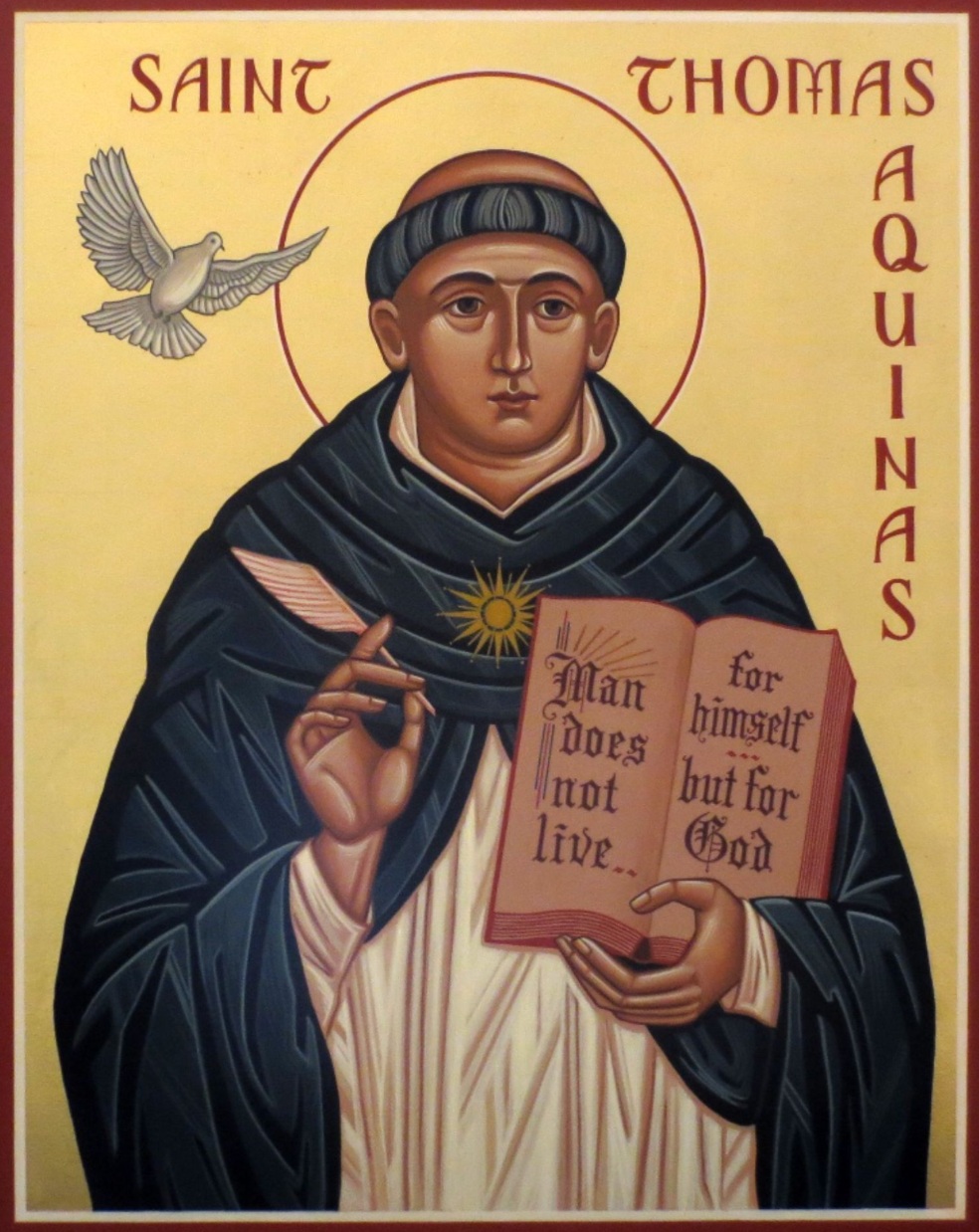
Enter ye in at the narrow gate: for wide is the gate, and
Broad is the way that leadeth to destruction, and many there are who go in
thereat. How narrow is the gate, and strait is the way that leadeth to life:
and few there are that find it! Beware of false prophets, who come to you in
the clothing of sheep, but inwardly they are ravening wolves.
Jesus
Christ; Matthew 7:13–15
Related WebPages
The Purpose of this grouping of links is to organize all site Cafeteria Catholic webpages in one place for easier reference.
LPMP Cafeteria Catholic Pages.
In the Cincinnati Archdiocese, the Athenaeum Of Ohio's LPMP (Lay Pastoral Ministry Program) consistently taught a do-it-yourself - let-your-conscience-be-your-guide Catholicism to future Lay Catholic Pastoral Ministers. Just think about that term for a moment. What have laymen to do with Pastoral Ministry in the Catholic Church? This was an Alinsky-Lite program of evil disinformation aimed at weakening Church authority and loosening Church doctrine in the minds of Catholic laymen.
Do our Catholic bishops promote and teach Roman Catholicism, or something less?
Cafeteria Catholicism, i.e., Pick-And-Choose Catholicism, is rampant in America, thanks to many American Catholic bishops.
(Cafeteria Catholicism 101)
My "Education" at the Athenaeum Of Ohio LPMP (Lay Pastoral Minstry Program).
The Athenaeum Of Ohio LPMP program was the required pre-requisite for
entry into the Deaconate program in Archbishop Daniel E. Pylarczyk's
Cincinnati Archdiocese.
(Cafeteria Catholic 1)
The hidden dissident agenda in the Athenaeum of Ohio LPMP teaching.
The overriding dissident agenda of Liberal Catholicism appeared
sometimes mostly in teaching material, sometimes in teachers themselves,
sometimes in both.
(Cafeteria Catholic 2)
A better name for the LPMP's Formation for Discipleship class: Catholic Dissent.
The Athenaeum of Ohio LPMP course called Formation for Discipleship was
one big long exercise in Catholic dissent, pure and simple.
(Cafeteria Catholic 3)
Moral Theology, Cincinnati Archdiocese style: This ain't your daddy's religion. Christian Ethics is the title of the course in the Athenaeum of Ohio LPMP course on Catholic Moral Theology.
(Cafeteria Catholic 4)
Athenaeum of Ohio LPMP Christology Course: NOT about the Christ Who Rose Again.
This theoretically Catholic
Christology course teaches about a Christ Who didn't know who he was,
didn't necessarily rise again after death, but Who "teaches us valuable
lessons" nonetheless.
(Cafeteria Catholic 5)
Athenaeum courses consistently taught that the early Church condoned slavery.
This teaching is clearly false. Yet the Athenaeum of Ohio LPMP program,
in multiple courses, officially taught that the Church "changed" its
teaching on slavery.
The "Enlightened" birthing of Historical-Critical Scripture analysis.
Historical Criticism of the most paranormal literature ever produced
calls into question the "enlightenment" of the enlightened.
Nito Gnoci
Linda Kimball
The White House: We Hold These Truths to be Self-Evident, That All Men are Created Equal and Endowed by their Creator with Inalienable Rights
The Sacrificial Fall of Lucifer and the Evolutionary Rise of the Death Cult’s Global Luciferian Religion
Two Kinds of Wisdom and the Lamb’s Book of Life Luke 10: 17-20
Hatred, Envy, Resentment, Vengeance: Why Whites Need Not Apply Lawless Politics of Sin
The evil materialist faith of global Luciferianism, Technocracy, Socialism, and Marxism
Prayer Against Wicked Ideologues Rescue us, O Lord!
System of Lies: Ideological Paradise on Earth and Why the Bloody, Violent Dream Will Not Die
Christendom and Protestant America’s Apostasy into Paganism A Timeline
The presence and influence of powers, principalities, and demons in our age of apostasy into godlessness
Nihilism…All That Exists is Matter and Energy The Worldview that Caused the Collapse of Christendom and Protestant America
Revisiting Nihilism: The Will Turned Toward Evil and the Destruction of Western and American Civilization
The enemies of God, reality, truth, western civilization and our souls Linda Kimbal column
The Last Hour and the New World Order Prayer
Our Call to Battle: Rise of the Spirit of Antichrist Prayer Article: “And this is that spirit of antichrist, whereof ye have heard that it should come; and even now already is it in the world.” (1 John 4:3)
God to Mankind: NOW Do You See the Stupidity, Depravity, and Evil in Your Hearts?
Raising the New Tower-- Occult Evolution: Antediluvian, Babylonian and Modern Expressions
Psychopathy and the Western and American Tyranny of Evil Leftist Progressive Myths
Supernatural Genesis 1-11 vs. Pagan Darwinism God and Liberty or Fallen Mankind and Tyranny
Luke 21: 29-31: Some Signs Of America's Abandonment And Spiritual Bondage
Eternal Paradise Or Hell? How And Why Both Choices Are Freely Made
Luciferian Humanists: Citing the Genesis Account is Evil "Any country grounded in Judaeo-Christian values can't be overthrown until those roots are cut ... "
Who is intolerant because ashamed: Creationists or Evolutionary Theists?
Death of the Christian God in Hearts of All Humans Why America and W. Europe are Committing Suicide
THE WORLDVIEW OF EVIL SPIRITS - an article by Linda Kimball MAGICAL MYSTERY CHURCH
Pagan-Darwinian-Materialism Redoubt of Miserable Self-Deceived Non-Self Nihilists
Americas' Spiritually Dead, Deep State and Ruling Class Nihilists Walking Dead Parasitic Idolaters
Doctrines of Demons and the Modern Pagan and Pantheist Antithesis The West's Greatest Threat
Gnosis: The Main Expression of Paganized Christianity in the New Age Inner Knowing, Self-Salvation
Our Age of Malicious Perversion How Truth, Meaning, and Reality Have Been Perverted
The Serpent's Gnostic Luciferian Elite Oligarchy and Global Powers Demonic Darkness Over the West and America
The Creation Model Versus Modern Pagan Models
2 Corinthians 10:5
What Kind of God Do You Believe In?
2 Cor. 10:5 Destroying 'scientific' arguments for false Gods
Evil Spirits, Death of God, Satanic Inversion Pagan America's Reality of Madness, Demonic Bondage, and Non-Self
Judgment and Wrath The Biblical Explanation for Madness and Evil
The Worldview of Evil Spirits Revolution, Evolution, Materialism, Nihilism, New World Order, and More
Gnosis The Main Expression of Modern Paganized Christianity
America's Transformation Into A Mystical Pantheist God-State What the Death of God Has Wrought
Message to All Wearied Truthtellers: Let Isaiah Be Your Inspiration the Remnant
The Triune God, Supernatural Heaven, Souls, Hell, and Demons Do They Exist?
Teachings of Demons The Aeon of Horus, Reign of God-Men, and End of the Christian God
Revelation 2:7" ...the closing of a steel door – a solemn, cataclysmic slamming of a door."
Systemic Nihilism: End of the Human Race Eternal Damnation of Human Souls
Infernal Apocalyptic Atmosphere Over America Disintegration into nothing
Global and Ruling Class Criminal Elitists Their Ring of Power and Pact with the Spirit of Death and Hell
Blessed is the Man Who Does Not Listen to Falling Stars Who Follow After Damnable Heresies
Darwinism: An Abomination Aborting and Rotting the Church. The falling away and apostasy from the one true and personal Holy Triune Creator God has not ended
The Evil One and the Impenitent Who Receive His Mark“. And the LORD God formed man (and) breathed into his nostrils the breath of life; and man became a living soul.” Genesis 2:7
The Fall of Mankind, the Religion of Evolution, and the Antichrist. "Pride goes before destruction and a haughty spirit before a fall." Proverbs 16:18
Why Secular Liberals Actively Promote Evil. Mentally Retarded Liberals
Cultural Marxism. The Many Hidden Faces of Living Active Communism
The Devil, the Big Bang, Evolution, Extraterrestrials and the Genesis Problem
The Ascension To Power Of Misogyny. Hatred of Women
Gnostic Chiliastic Evolution: Satan's Alternative Plan of Salvation. The Great Reset
Why Proclaiming Jesus Christ the Word Became Flesh is Offensive. The Technocratic Utopian World Order
The Divine Androgyne, Pandemonium, and the Battle for Our Souls. Satan's Rising New World Order
America's Modern Pagan Oligarchy, Aztec Gods, and Human Sacrifice. Isaiah 57 Revisited
The Peace Symbol: Occult Sign Meaning Death Against Christians. Hatred of Jesus Christ and Christianity
Americas’ Spiritually Desolate, Parasitic, Ruling Class Nihilists. Satan and Powers and Principalities
Global Oligarchy, Forces of Darkness, and the Spirit of Antichrist. Forces Darkness Within Church and State
Darwinism: Idol of mind symbolizing hatred of Triune Creator God. And Logical End of America
Is the World a Computer Simulation in the Minds of Robotic Overlords? Magic Science, Transhumanists, Gnostic Physicists.
Your soul: Cost of admission to the Progressive Pagan City of Man. New Egypt, Babylon, Sodom and Gomorrah
Iron Curtain Over American Minds Progressive Marxisms’ Ideological Utopia
Satan’s New World Order Blueprint and Key Strategy. Christian Capitulation To the Serpent's Consensus Process
Chaos, Breakdown, Demoralization, Destruction: America's New Normal. How it came about and where we are going.
Demonic Darkness: America's Invisible Wave of Evil. Staring into the abyss
Cain, Marxism, Leftism and America's ruling class of 'superior' humans. The dragon they have in common
Modernist Christians in a Man-Centered Universe. Scientific Neutrality and Biblical Deconstruction
The Connection Between Baphomet and Why Researchers Are Creating Interspecies Embryos. 2 Corinthians 10:5
Isaiah 57 revisited: America's progressive pagan elites. Staring into the Abyss
Evolutionary Theism Implies That Christ is Wrong About Creation. "For if you believed Moses, you would believe Me, for he wrote about Me. But if you do not believe his writings, how will you believe My words?" John 5:46-47
Utopianism. Progressive Utopian Cultural Marxism Poisoning Minds, Churches, Schools, Politics
Acts 17:18-19-modern pagan and pantheist antithesis of the Word of God Ecclesiates 1:9 "What has been is what will be.."
Trotsky's Permanent Revolution From Hell In America. The Soviet System in America
Why Transgenderism Is Being Forced Upon America and Our Children. The Divine Androgyne
The Evil Eye Of Envy: Why Being ‘White’ Is Offensive To Some People. No Vice Worse Than Envy
Absolute Nothingness and Non-Self: The Reigning Worldview of Global Power Elites and Western Ruling Classes
What is Evil? Man-made alternative realities
Cliff Kincaid
Trump is Destroying Reagan's Legacy By Cliff Kincaid
Trump is a Marked Man By Cliff Kincaid
Terrorist Attack in Baltimore By Cliff Kincaid
Moscow Terror Attack is Another KGB Operation to Fool the West
Obama’s New Nazi-Communist Alliance
On the "Days Of Rage" Planned For The 2024 Marxocrat Party Convention Some of you just couldn't believe that the formerly Democrat
(Confederate) Party had already gone totally Communist before the 1968
Party Convention
Making Russia Great Again By Cliff Cinkaid
De-Nazification and De-Communization in Russia The The mutual non-aggression Hitler-Stalin Pact, which started World War II, has been carefully “forgotten”
Climate Emergency To Produce a New World Order By Cliff Kincaid
The Next Phase of Obama’s “Permanent Revolution” By Cliff Kincaid
Evil in the White House In This War, The Enemy Is In The Ranks, Standing Right Next To You
Satanism, Communism: What's The Difference? Look To The Roots Of Communism
Fox Is the Leading "Trans" Channel There are some rather peculiar goings-on at the Fox News Channel.
Trump and His Communist Enemies The Demonized Joe McCarthy Turned Out To Be Accurate In Everything He Claimed: Fox News Is Wrong About Him And About Much More
The Five Stooges on Capitol Hill They Think We Need Even More Doped No-Hopers In The American Intelligence Community
The Biden Doctrine of Demoralization and Defeat By Cliff Kincaid
A Republican Church Committee? Do Pro-American Republicans Even Know Who Frank Church Really Was?
A Top to Bottom Housecleaning of America When we clean our house, my wife has a slogan, “Top to bottom,” meaning you have to target the whole house. The same advice applies to nations.
China's Mass Murder Experiment Phase Two
Bury The Dead And Move On Fuggedaboutit!
9/11 Truth This is the real 9/11 Truth: Our “intelligence” agencies are infiltrated.
Moving Toward Gorbachev’s “World of Communism” It's called the Monster Plot.
The Errors of Russia, the Dupes of Putin, and Another Holocaust Can The Increasingly Faithless Free World Be Saved From Russia?
World War Quietly Conquering A Distracted and Blithely Unaware World. Could it actually be Satan's world war on despised humanity?
Stand With Ukraine Against Russia and China By Cliff Kincaid
Tucker Carlson Carlson Gets His Comeuppance. Tucker's View: It is not moral for us to intervene in support of any nation's (Ukraine's) democratic self-determination and against Soviet military expansion.
The Need for Secure Borders. Have we so easily forgotten what borders are for? Have we forgotten that evil exists in the world? Have we forgotten how to keep apart from this evil?
Can Ukraine Survive Putin and Biden? Can America? Can the Free World? Can Faith in God?
The Soviet Union: Back From The Dead The Return of the Evil Empire
Could an American Surrender be in the offing with Biden at the wheel? Is this not the perfect time for Communism to strike, with Commies now governing America, China and Russia? What would Biden do?
Abortion and Communism. If you ever wondered where all the popular abortion-contraception-sexuality-perversion nuttiness came from, look to Marx's Communist Manifesto.
The Secret Life of Martin Luther King, Jr. A life almost totally at odds with his reputation as a minister of the Gospel.
"We belong to the Church militant; and She is militant because on earth the powers of darkness are ever restless to encompass Her destruction. Not only in the far-off centuries of the early Church, but down through the ages and in this our day, the enemies of God and Christian civilization make bold to attack the Creator's supreme dominion and sacrosanct human rights." --Pope Pius XII
"It is not lawful to take the things of others to give to the poor. It is a sin worthy of punishment, not an act deserving a reward, to give away what belongs to others." --St. Francis of Assisi
Truth is incontrovertible. Malice may attack it, ignorance may deride it, but in the end, there it is.—Winston Churchill
The smallest minority on earth is the individual. Those who deny individual rights cannot claim to be defenders of minorities.—Ayn Rand
Atheist Genesis:
In the beginning there was nothing, and nothing happened to nothing.And then nothing accidentally exploded and created everything.
And then some bits of everything accidentally encountered other bits of everything and formed some new kinds of everything.
And then some bits of everything accidentally arranged themselves into self-replicating bits of everything.
And then some self-replicating bits of everything accidentally arranged themselves into dinosaurs.
See?
(See The Darwinism Pages)
If you can't find the page you're looking for, try the
SITE MAP.







